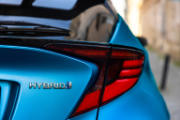
(12.02.2025) The Swiss automotive market saw a 5% year-on-year decline in 2024, with sales of electric and plug-in hybrid vehicles dropping by 12.5% and 10.4%, respectively, according to Auto-Suisse, the umbrella association of importers.
A total of 239,535 cars were registered in Switzerland and Liechtenstein in 2024, 12,679 fewer than in 2023 (-5%). The downward trend became more pronounced toward the end of the year, with new vehicle registrations in December 2024 falling by 5.9% compared to the same month in the previous year.
Alternative propulsion vehicles (electric, hybrid, mild-hybrid, and plug-in hybrid models) reached record levels in 2024, capturing a 61.6% market share. This growth was driven by the strong performance of hybrid and mild-hybrid engines (+17%) and accounted for 33.6% of new vehicle registrations (+6.3 points). In contrast, sales of fully electric vehicles (46,141, -12.5%) and plug-in hybrids (20,801, -10.4%) declined.
According to Auto-Suisse, electric and plug-in hybrid models represent only 28% of the market. The association attributes this slowdown in part to the removal – effective January 1, 2024 – of the import tax exemption for electric vehicles. Additionally, a parliamentary decision excluded private charging infrastructure expansion from the revised CO2 law. Adopted in March 2024, this legislation defines Switzerland’s federal climate policy for 2025-2030, setting targets for a 58% reduction in average emissions for new cars and a 70% reduction for trucks. Importers who fail to meet these targets will face penalties.
Auto-Suisse director Thomas Rücker is urging authorities to take measures to facilitate the transition to electric vehicles. The goal is to prevent penalties from driving up sales prices. He is specifically advocating for lower charging costs, easier access to home charging stations, and a suspension of the import tax on electric vehicles.
Last modification 12.02.2025





